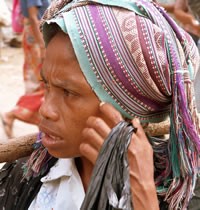The Tetun, also known as Tetum or Belu in local contexts, are an indigenous Austronesian ethnic group native to the central and southwestern regions of Timor Island, primarily inhabiting the Belu and Malaka Regencies in East Nusa Tenggara Province, Indonesia, with historical ties extending into what is now Timor-Leste.
Their name derives from the Tetum language, a Malayo-Polynesian tongue that serves as a marker of identity across the island's divided halves, spoken in dialects like Tetun-Belu and Tetun Terik that reflect regional variations in pronunciation and vocabulary.
As descendants of ancient Austronesian migrants who arrived around the 13th century, blending with Melanesian substrates, the Tetun established hierarchical societies centered on fertile river valleys and coastal plains, forming the expansive Belu empire that once dominated much of central Timor through kinship alliances and tribute systems.
Pre-colonial Tetun culture featured animistic reverence for ancestral spirits and natural forces, with oral epics recounting migrations guided by sacred stones and pacts among liurai (rulers) to maintain harmony amid inter-clan raids and trade in sandalwood, horses, and textiles with distant Chinese and Javanese ports.
The 16th century introduced Portuguese colonial footholds in the east, fostering Catholic missions that influenced Tetun elites while Dutch VOC traders in the west imposed clove monopolies, sparking resistance and hybrid economies by the 17th century. Under divided rule—Portuguese in the east and Dutch in the west—the Tetun navigated suzerainty through adaptive governance, with Belu serving as a cultural crossroads; the 19th century saw intensified evangelization, transforming animistic rituals into syncretic Christian practices.
Post-World War II decolonization led to Indonesia's 1975 annexation of the east, unifying the island under Jakarta's administration until Timor-Leste's 1999 independence referendum, which redrew borders and displaced communities, including Tetun families caught in violence.
Today, Indonesian Tetun communities preserve adat customs amid national integration, contributing to border diplomacy while facing modernization's pull on their linguistic and ritual heritage.
The Tetun inhabit a mosaic of rugged highlands and coastal hamlets in West Timor's sun-scorched valleys, where monsoon cycles and clan loyalties shape a resilient blend of subsistence farming and cross-border kinships, fostering communal bonds in Indonesia's eastern frontier. Work revolves around agrarian and pastoral pursuits, with families cultivating rice, corn, and cassava on terraced slopes using traditional uma lulik (sacred houses) as communal hubs. At the same time, men herd Timor ponies and water buffalo for plowing or market sales in Atambua. Women harvest peanuts, weave tenun cloths dyed with morinda roots, or process coffee beans for export. Many balance this with seasonal labor in Kupang fisheries or transmigrant schemes, adapting ancestral reciprocity to wage economies.
Family dynamics emphasize patrilineal clans in extended uma compounds, where elders—clad in tais sarongs—mediate via council fires reciting epic verses, marriages strengthen alliances through bridewealth of gongs or livestock and multi-day feasts evoking ancestral unions, and child-rearing unfolds collectively with grandparents teaching tonal lullabies and weaving skills to instill values of hospitality and earth stewardship.
Celebrations punctuate the lunar calendar with vibrant rituals, including the annual harvest thanksgiving with gong orchestras and caci whip dances symbolizing fertility and defense, initiation ceremonies for youths marked by scarification and mock battles under sacred banyan trees, and weddings blending church vows with ancestral toasts; funerals extend weeks in vigils with effigy processions to honor the deceased's journey to the spirit realm.
Food reflects the land's modest abundance in spiced, shared feasts, staples of jagung bakar (grilled corn slathered in coconut sambal) paired with ikan pepes (banana-leaf-steamed fish with turmeric and chilies), roasted wild pig or dog meat in vitality rites, and tempe goreng (fermented soybean fritters); tuak palm wine flows during gatherings, with klepon rice cakes capping communal platters that affirm kinship and the island's enduring cycles.
The Tetun primarily adhere to Christianity, particularly Roman Catholicism, a faith integrated through centuries of Portuguese missionary influence that reshaped their animistic foundations into a monotheistic framework emphasizing sacraments, communal redemption, and divine protection over harvests and kin. This belief manifests in daily devotions at uma lulik chapels through vernacular prayers in Tetun dialects and rosary circles invoking the Virgin Mary as a maternal guardian, with priests guiding ethical living framed as covenant with the creator. Elders fuse biblical teachings with ancestral motifs, such as viewing sacred stones as altars to God's providence, while parishes anchor moral dialogues and aid networks, with lingering spirit harmonies in harvest blessings.
Strengthening bilingual education programs incorporating Tetun dialects alongside Indonesian would safeguard linguistic heritage against erosion in schools and media, empowering youth to navigate national identity. Community-driven conservation of riverine farmlands through sustainable irrigation would mitigate drought impacts from climate variability, preserving agricultural traditions vital to clan economies. Enhanced cross-border health initiatives addressing malaria and maternal care would bridge access gaps in remote villages, fostering resilience amid historical displacements.
Pray for vibrant Tetun-language Scripture engagement in parishes, inspiring family devotions that disciple youth and reclaim epic chants as vessels of worship.
Pray against syncretic drifts with ancestral spirits, ushering renewals that affirm Christ's centrality in uma lulik lives.
Pray for harmonious dialogues with Muslim Atoni neighbors, nurturing shared testimonies across Timor's divides.
Pray for resilient soil management to sustain rice terraces and buffalo herds, yielding bountiful provisions for communal larders.
Pray for artisan cooperatives weaving tenun into global trade, fortifying women's roles amid urbanization's pull.
Pray for fortified border clinics combating tropical fevers, bolstering clans without severing sacred ties.
Scripture Prayers for the Tetun in Indonesia.
Wikipedia. "Tetum people."
https://en.wikipedia.org/wiki/Tetum_people
Britannica. "Tetum."
https://www.britannica.com/topic/Tetum
EveryCulture.com. "Tetum."
https://www.everyculture.com/East-Southeast-Asia/Tetum.html
Cultural Atlas. "East Timorese - Core Concepts."
https://culturalatlas.sbs.com.au/east-timorese-culture/east-timorese-culture-core-concepts
Wikipedia. "Tetum language."
https://en.wikipedia.org/wiki/Tetum_language
EveryCulture.com. "Indonesia - Culture."
https://www.everyculture.com/Ge-It/Indonesia.html
PMC. "Ethnomedicine of Tetun ethnic people in West Timor Indonesia: philosophy and practice in the treatment of malaria."
https://www.ncbi.nlm.nih.gov/pmc/articles/PMC6600717/
Taylor & Francis Online. "The languages on the border of Indonesia and Timor Leste: A linguistic landscape study."
https://www.tandfonline.com/doi/full/10.1080/23311983.2023.2273145
GNU.org. "Chapter 2. THE PEOPLE OF EAST TIMOR." https://www.gnu.org/software/tetum/contributors/cliffMorris-xhtml/ch02.html
| Profile Source: Joshua Project |











